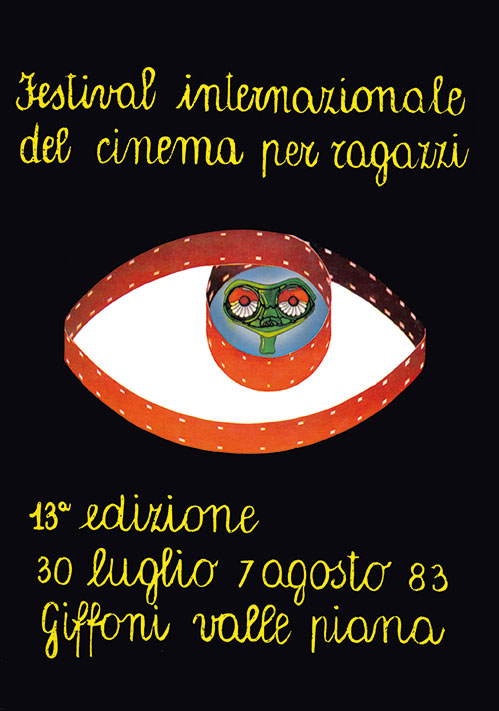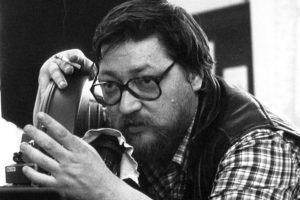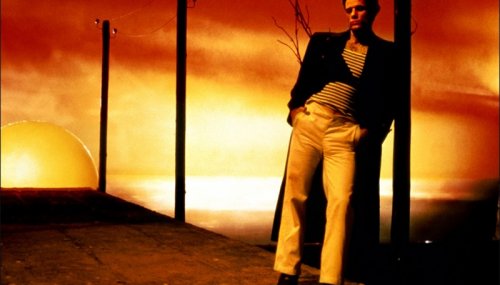Synopsis
French sailor Querelle arrives in Brest and starts frequenting a strange whorehouse. He discovers that his brother Robert is the lover of the lady owner, Lysiane. Here, you can play dice with Nono, Lysiane's husband : if you win, you are allowed to make love with Lysiane, if you lose, you have to make love with Nono... Querelle loses on purpose...

Sections & Films
QUERELLE
| Original Title | Querelle |
| Italian Title | Querelle de Brest |
| Category | Out of competition |
| Section | Review "Youth Problems in Contemporary World" |
| Tipology | Feature Film |
| Duration | 108' |
| Production Year | 1982 |
| Nationality | France, West Germany |
| Directed by | Rainer Werner Fassbinder |
| Story | Rainer Werner Fassbinder |
| Main cast | Brad Davis, Franco Nero, Jeanne Moreau |
 RAINER WERNER FASSBINDER
RAINER WERNER FASSBINDER
Fassbinder was born into a bourgeois Bavarian family in 1946. His father was a doctor and his mother a translator. In order to have time for her work, his mother frequently sent him the movies, a practice that gave birth to his obsession with the medium. Later in life, he would claim that he saw a film nearly every day and sometimes as many as three or four. At the age of 15, Fassbinder defiantly declared his homosexuality, soon after which he left school and took a job. He studied theater in the mid-sixties at the Fridl-Leonhard Studio in Munich and joined the Action Theater (aka, Anti-Theater) in 1967. Unlike the other major auteurs of the New German Cinema (e.g., Schlöndorff, Herzog and Wenders) who started out making movies, Fassbinder acquired an extensive stage background that is evident throughout his work. Additionally, he learned how to handle all phases of production, from writing and acting to direction and theater management. This versatility later surfaced in his films where, in addition to some of the aforementioned responsibilities, Fassbinder served as composer, production designer, cinematographer, producer and editor. [So boundless was his energy, in fact, that he appeared in 30 projects of other directors.] In his theater years, he also developed a repertory company that included his mother, two of his wives and various male and female lovers. Coupled with his ability to serve in nearly any crew capacity, this gave him the ability to produce his films quickly and on extremely low budgets.
Success was not immediate for Fassbinder. His first feature length film, a gangster movie called L'amore è più freddo della morte (1969) was greeted by catcalls at the Berlin Film Festival. His next piece, Il fabbricante di gattini (1969), was a minor critical success, garnering five prizes after its debut at Mannheim. It featured Jorgos, an emigrant from Greece, who encounters violent xenophobic slackers in moving into an all-German neighborhood. This kind of social criticism, featuring alienated characters unable to escape the forces of oppression, is a constant throughout Fassbinder's diverse oeuvre. In subsequent years, he made such controversial films about human savagery such as Pionieri a Ingolstadt (1971) and Whity (1971) before scoring his first domestic commercial success with Händler der vier Jahreszeiten (1972). This moving portrait of a street vendor crushed by the betrayal and his own futility is considered a masterpiece, as is his first international success La paura mangia l'anima (1974) (Fear Eats the Soul). With a wider audience for his efforts, however, some critics contend that Fassbinder began to sell out with big budget projects such as Despair (1978), Lili Marleen (1981) and Lola (1981). In retrospect, however, it seems that the added fame simply enabled Fassbinder to explore various kinds of filmmaking, including such "private" works as Un anno con 13 lune (1978) and La terza generazione (1979), two films about individual experience and feelings. His greatest success came with Il matrimonio di Maria Braun (1979) (The Marriage of Maria Braun), chronicling the rise and fall of a German woman in the wake of World War II. Other notable movies include Le lacrime amare di Petra Von Kant (1972), Il diritto del più forte (1975), Nessuna festa per la morte del cane di Satana (1976) and Querelle de Brest (1982), all focused on gay and lesbian themes and frequently with a strongly pornographic edge.
His death is a perfect picture of the man and his legend. On the night of June 10, 1982, Fassbinder took an overdose of cocaine and sleeping pills. When he was found, the unfinished script for a version of Rosa Luxemburg was lying next to him. So boundless was his drive and creativity that, throughout his downward spiral and even in the moment of his death, Fassbinder never ceased to be productive.






